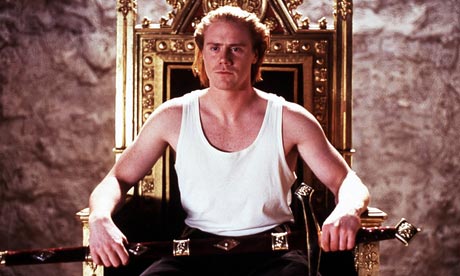
Edward II (1991)
Director: Derek Jarman
Entertainment grade: A–
History grade: C
Edward II became king of England in 1307. His 20-year reign was politically disastrous for the nation and ended with him being deposed by his own wife.
Sexuality
Derek Jarman's film begins with Edward II (Steven Waddington) and his favourite, Piers Gaveston (Andrew Tiernan), lounging on a bed, while two sailors have it off in the background. Next, a naked man crowned in gold kisses a great big snake. If you look very closely, you may detect an extremely subtle hint of homoeroticism here.
So, was Edward II gay? It's difficult to prove who had sex with whom in history unless children were produced, but there is no doubt that the king and Gaveston were at least in an intense emotional relationship. At other times, Edward was thought to be involved with other men, and must have dallied with at least one (unknown) woman outside his marriage – he acknowledged a bastard son, Adam FitzRoy. Other British monarchs who had intimate relationships with same-sex favourites include James I, William III, Mary II and Anne.
Children
England's nobles are irritated by Gaveston's influence on the king. Edward's wife, Queen Isabella (Tilda Swinton), allies both politically and romantically with Roger Mortimer (Nigel Terry). Her young son, the future Edward III, is at the centre of events; but fortunately this film neither buys into the tiresome historical myth that he was fathered by Mortimer, nor the ludicrous Braveheart myth that he was fathered by William Wallace.
Anachronism
The film is based on Christopher Marlowe's 1593 play, which is unusual for its time in openly portraying a gay relationship. Jarman's version mixes up historical and modern costumes. When the king reluctantly exiles Gaveston, Annie Lennox turns up to sing Cole Porter's 1944 song Ev'ry Time We Say Goodbye. Edward's army is transformed into a group of gay rights protesters, waving placards that say: "Get your filthy hands off our bodies." These anachronisms needn't upset the historical viewer: it's clear that Jarman is making a deliberate and valid point about the oppression of gay people throughout history. But the film's focus on the homophobia as the main factor in Edward II's downfall is open to dispute. In real life, England had been stricken by civil war, rebellions and famine throughout his reign, and he had lost most of Scotland to Robert the Bruce at the Battle of Bannockburn. Whether or not he was a queen, Edward II just didn't cut it as a king.
Violence
In the film, Gaveston is garrotted by a modern policeman with a baton. In real life, he was abducted and beheaded by a consortium of earls. The king moves on to Hugh Despenser the Younger, known in Marlowe's play and Jarman's film as Spencer. Despenser was destined for an even stickier end than Gaveston. According to one account, he was sent up a ladder and publicly castrated while still alive. Whether or not that happened, he was drawn, then hanged, then beheaded, then quartered and distributed in bits around England. The film's Spencer is merely strangled by Mortimer.
Death
Edward II is forced to abdicate. "My daily diet is heart-breaking sobs," says the former king, "that almost rent the closet of my heart." Though Jarman has altered some of Marlowe's lines to enhance the gay theme, that one is original. Edward was imprisoned and probably murdered in 1327 (a few historians argue that he may have escaped into exile). He is widely believed to have been disembowelled with a red-hot poker, though some historians suggest suffocation was a more likely cause of death. The film shows the red-hot poker incident as a premonition experienced by the former king, but doesn't state it as fact. Top marks.
Verdict
Edward II's fall was about more than his sexuality, but Jarman's use of that element of the historical story to reflect on modern homophobia makes for an intelligent and striking film.

